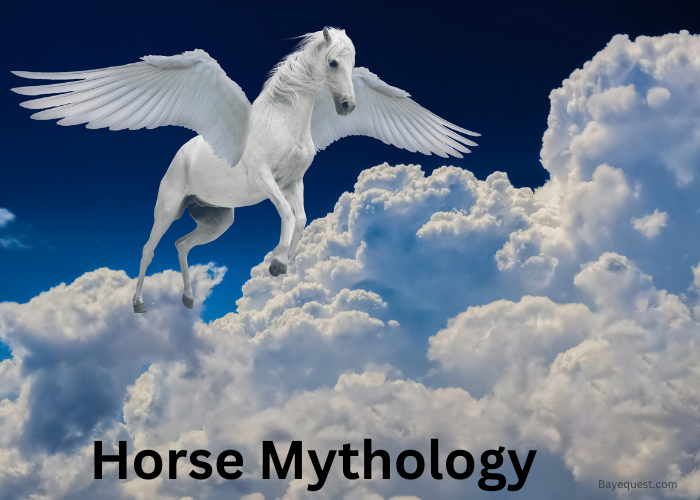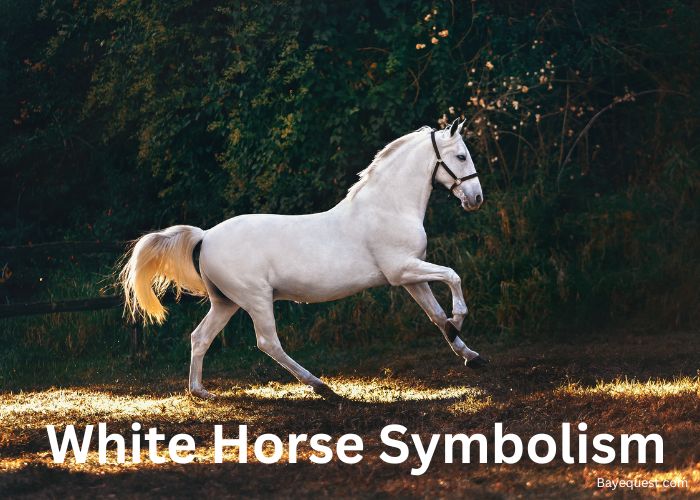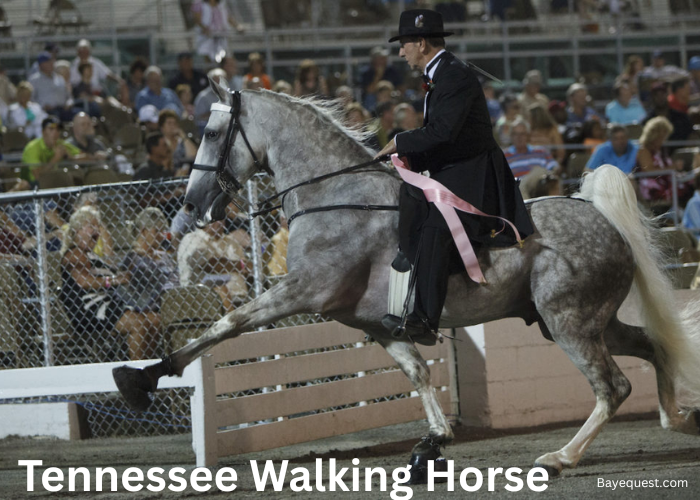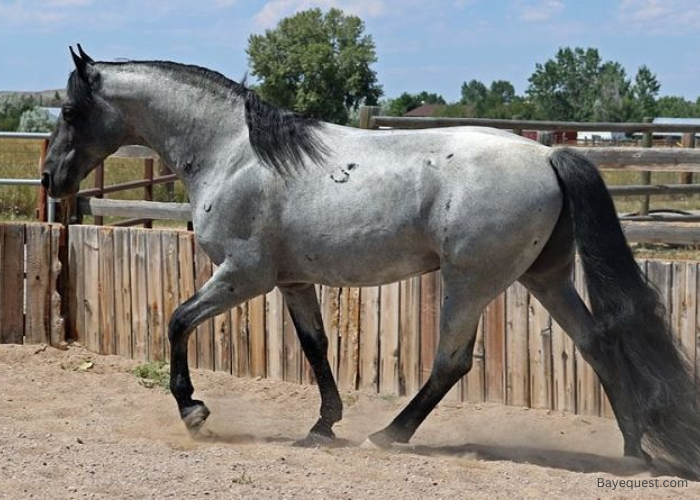Horses have galloped through myths for centuries. They’ve carried gods, fought in battles, and even flown through the skies.
From Pegasus in Greek lore to Odin’s eight-legged steed in Norse legends, these horses aren’t just animals, they’re symbols.
Some are brave. Others are wild and strange.
They show up in stories about power, freedom, and destiny.
Every culture has its own magical horse tale. And many of those stories still inspire us today.
So what makes these mythic horses unforgettable? Let’s dive into their powerful and fascinating legends.
Common Themes in Horse Mythology
Some common themes in horse mythology are:
1. Strength and power
Horses often symbolize strength and endurance. Many cultures see them as powerful creatures capable of carrying heroes into battle or pulling chariots of the gods.
Their speed and stamina make them a symbol of might and resilience.
2. Freedom and independence
Horses represent freedom in many myths. They are often depicted as wild and untamed, embodying the human desire for adventure and liberation.
Stories of free-spirited horses roaming vast landscapes reflect this theme.
3. Divine connection
Many mythologies link horses to gods and supernatural forces.
From the sun-chariot horses of Apollo to the divine steed Sleipnir in Norse myths, these animals often serve as messengers or companions to deities.
4. Transformation and magic
Some myths feature shape-shifting horses or enchanted creatures with special abilities.
The Celtic Kelpie and the Greek Pegasus are examples of horses with magical qualities that transcend the ordinary.
5. Loyalty and companionship
Horses are portrayed as loyal companions to heroes and warriors.
They stand by their riders in times of battle and hardship, reflecting values of trust and partnership.
6. Death and the afterlife
In many cultures, horses are linked to the journey to the afterlife.
They guide spirits to the next world, appearing in funerary art and rituals as sacred beings that bridge life and death.
7. Fertility and prosperity
Horses are often connected to abundance and good fortune.
In some traditions, they are linked to agricultural success and wealth, serving as symbols of prosperity.
8. Heroic journeys
Horses frequently appear in myths as key companions in epic quests.
They carry heroes across difficult terrain, helping them overcome obstacles and achieve their destinies.
Read also: Horse Mythical Names.
Horses in Greek Mythology
Horses play a significant role in Greek mythology, often associated with gods, heroes, and legendary creatures.
They symbolize power, speed, and divine connection.
Some of the most famous horses in Greek myths include:
1. Pegasus
Pegasus is one of the most well-known mythological horses. He is a winged horse born from the blood of Medusa when the hero Perseus beheaded her.
Pegasus is often linked to Bellerophon, a mortal hero who tamed him with the help of Athena.
Together, they defeated the fire-breathing Chimera.
Pegasus eventually became a symbol of inspiration and was placed among the stars as a constellation.
2. The Horses of Apollo
Apollo, the Greek god of the sun, is said to ride a chariot pulled by fiery horses across the sky.
These divine horses bring light to the world each day.
They represent power and the eternal cycle of day and night, showcasing the gods’ control over natural forces.
3. The Mares of Diomedes
These were four man-eating horses owned by Diomedes, the king of Thrace.
As part of his Twelve Labors, the hero Heracles (Hercules) was tasked with capturing them.
These terrifying beasts symbolize chaos and destruction, as they were said to be wild and uncontrollable due to their diet of human flesh.
4. Trojan Horses
While not a living horse, the Trojan Horse is one of the most famous symbols in Greek mythology.
It was a large wooden horse used by the Greeks to secretly infiltrate and conquer the city of Troy.
The tale represents deception and strategic cunning, showing how the idea of a horse played a crucial role in mythology and warfare.
5. Poseidon’s Horses
Poseidon, the god of the sea, is also known as the creator of horses.
He is often depicted riding a chariot pulled by powerful sea-horses, called Hippocampi, which are part horse and part fish.
Horses were sacred to Poseidon, and he was believed to have created them as a gift to humanity.
Horses in Norse Mythology
Horses hold a special place in Norse mythology, often symbolizing strength, speed, and a connection to the divine.
They are featured in tales of gods, warriors, and mythical creatures. Some of the most famous horses in Norse mythology include:
1. Sleipnir
Sleipnir is the most famous horse in Norse mythology and belongs to Odin, the chief god.
This remarkable horse has eight legs, which symbolize unmatched speed and strength.
Sleipnir is the fastest and most powerful steed in all the realms, capable of traveling between the worlds of gods, humans, and the underworld.
According to legend, Loki, the trickster god, shape-shifted into a mare and gave birth to Sleipnir after a scheme involving a giant builder and his horse.
2. The Horses of the Gods
Many Norse gods had their own powerful horses, each with special abilities.
Gullfaxi, meaning “Golden Mane,” was a horse given to the god Thor after a battle with the giant Hrungnir.
Blóðughófi, or “Bloody Hoof,” belonged to the god Freyr and was known for its ability to travel through fire unharmed.
3. The Valkyries’ Steeds
Valkyries, the warrior maidens who serve Odin, ride flying horses across the skies.
They choose which fallen warriors are worthy of entering Valhalla, Odin’s great hall for heroes.
These horses are believed to travel between the realms of the living and the dead, representing the link between life and the afterlife.
4. Horses in Ragnarok
During Ragnarok, the prophesied end of the world, horses play a significant role.
Many gods and warriors ride into battle on their powerful steeds, representing strength and readiness for the final confrontation.
Odin, riding Sleipnir, leads the charge against the forces of chaos.
5. Horse Sacrifices and Symbolism
In Norse culture, horses were often sacrificed in religious ceremonies to honor the gods or as part of burial rituals.
They were considered sacred animals that could guide the souls of the dead to the afterlife.
Archaeological findings suggest that horses were buried alongside warriors to assist them in the afterlife.
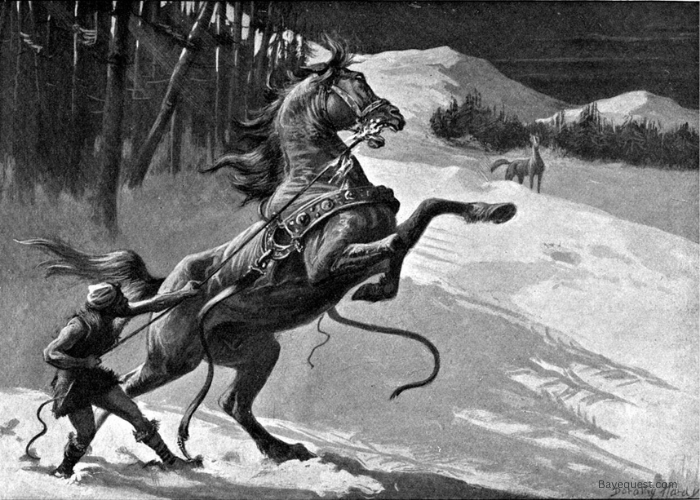
Horses in Celtic Mythology
Horses play a powerful role in Celtic mythology, symbolizing strength, fertility, and connection to the spiritual world.
Some of the most significant horses and horse-related myths in Celtic tradition include:
1. Epona: The Horse Goddess
Epona is one of the most revered figures in Celtic mythology. She is the goddess of horses, fertility, and abundance.
Often depicted riding a horse or standing beside one, Epona was believed to protect riders and ensure prosperity.
Her worship spread beyond the Celtic lands, even reaching the Roman Empire, where she was honored by cavalry units.
Epona represents the sacred bond between humans and horses, offering protection in both life and death.
2. The Kelpie: The Shape-Shifting Water Horse
The Kelpie is a legendary creature in Celtic folklore, known as a shape-shifting water spirit that takes the form of a horse.
Found in rivers and lakes, it lures unsuspecting travelers onto its back, only to drag them into the water.
The Kelpie symbolizes the dangers of the unknown and the unpredictable forces of nature.
Despite its dark reputation, it also represents the strength and mystery of the natural world.
3. The Ceffyl Dŵr: The Welsh Water Horse
Similar to the Kelpie, the Ceffyl Dŵr is a mythical water horse from Welsh folklore.
It is said to rise from lakes or waterfalls and sometimes take to the skies, symbolizing the fluidity between the earthly and spiritual realms.
Unlike the Kelpie, the Ceffyl Dŵr is sometimes seen as a helpful guide rather than a threat.
4. The Macha Curse and the Horse Race
Macha, an important figure in Irish mythology, is associated with horses and sovereignty.
In one famous tale, she is forced to race against the king’s horses while heavily pregnant, after which she curses the men of Ulster with weakness in times of need.
Her story highlights the deep connection between horses, power, and justice in Celtic tradition.
5. The Horses of the Sidhe (Fairy Folk)
In Celtic folklore, the Sidhe, or fairy folk, were believed to ride majestic white horses that could travel between the human and spiritual realms.
These magical horses were symbols of otherworldly power and were often featured in tales of heroes who were granted special steeds to undertake epic quests.
6. Horses in Celtic Warfare
Celtic warriors were known for their skill in horseback riding, often charging into battle on their swift and powerful horses.
Horses were symbols of nobility and strength, and warriors believed they had a spiritual bond with their steeds.
Chariots pulled by horses were also a key part of Celtic warfare.
7. Horses in Celtic Art and Symbolism
Horses frequently appear in Celtic artwork, carvings, and jewelry.
They are depicted in intricate designs that emphasize their grace and strength.
The presence of horses in burial sites suggests they were considered sacred and played a role in guiding souls to the afterlife.
8. Rhiannon: The Enigmatic Horse Goddess
In Welsh mythology, Rhiannon is a significant figure linked to horses and sovereignty.
She is often portrayed riding a magical white horse, which moves so swiftly that it cannot be caught.
Her story involves themes of endurance, transformation, and justice, making her an enduring symbol of feminine strength and wisdom.
Horses in Hindu Mythology
Horses hold a special place in Hindu mythology, symbolizing strength, speed, and divine power.
Some of the most notable horses and their stories in Hindu mythology include:
1. Uchchaihshravas: The Divine Horse
Uchchaihshravas is a magnificent, seven-headed celestial horse that emerged from the churning of the ocean (Samudra Manthan).
According to Hindu texts, this white horse was taken by Indra, the king of the gods, and became his divine steed.
Uchchaihshravas symbolizes power, majesty, and the pursuit of spiritual knowledge.
The horse is often depicted as a symbol of supreme strength and is considered the king of all horses.
2. The Ashvins: Divine Twin Horsemen
The Ashvins, or Ashwini Kumaras, are twin gods associated with healing and medicine.
They are depicted riding golden horses and are known as the physicians of the gods.
They travel swiftly across the heavens, bringing health and protection to those in need.
Their role highlights the connection between horses and speed, vitality, and healing in Hindu mythology.
3. Hayagriva: The Horse-Headed God
Hayagriva is an avatar of Lord Vishnu, depicted with the head of a horse and the body of a man.
He represents wisdom, knowledge, and the power of learning. According to legend, Hayagriva restored the Vedas (sacred texts) after they were stolen by demons.
His horse-headed form symbolizes the pursuit of intellect and divine wisdom.
4. The Ashvamedha Yajna (Horse Sacrifice Ritual)
In ancient Hindu tradition, the Ashvamedha Yajna was a grand ritual performed by kings to assert their supremacy.
A sacred horse was allowed to roam freely, and the lands it covered were claimed by the king.
This ritual signified the king’s authority, prosperity, and divine blessing.
The Ashvamedha Yajna is mentioned in texts such as the Ramayana and Mahabharata, reflecting the horse’s role in royal power and religious significance.
5. Lord Kalki and His White Horse
Hindu prophecy describes Kalki, the tenth and final avatar of Vishnu, who will appear at the end of the current age (Kali Yuga).
He will arrive on a mighty white horse named Devadatta, wielding a sword to rid the world of evil and restore righteousness.
This imagery portrays the horse as a symbol of divine intervention and justice.
6. The Horses of Surya (The Sun God)
Surya, the sun god, is often depicted riding a golden chariot pulled by seven horses.
These horses represent the seven days of the week and the seven chakras of the human body, symbolizing movement, time, and spiritual progress.
The horses of Surya highlight the connection between cosmic order and the power of horses in maintaining balance.
7. Arjuna’s Horses in the Mahabharata
In the epic Mahabharata, Arjuna’s chariot is driven by Lord Krishna and drawn by powerful white horses.
These horses symbolize purity, speed, and victory.
Arjuna’s horses played a crucial role in the Kurukshetra war, representing divine guidance and warrior strength.
8. Horses in Hindu Temples and Symbolism
Horses are often depicted in Hindu temple sculptures and art, symbolizing power, speed, and spiritual progress.
Many temples dedicated to deities like Vishnu and Ayyappa feature statues of horses, reflecting their importance in mythology and devotion.
Horses in Chinese Mythology
Horses have a special place in Chinese mythology. They symbolize strength, speed, and success.
People see them as noble and powerful animals. Horses appear in many Chinese legends and stories.
1. Heavenly Horses (Tianma)
Tianma means “heavenly horse.” These horses were believed to come from the west.
They were fast and powerful. Some stories say they could fly. People thought they brought good luck and victory.
2. The Horse in the Chinese Zodiac
The horse is one of the 12 animals in the Chinese zodiac. It stands for energy, freedom, and intelligence.
People born in the Year of the Horse are seen as hardworking and independent.
3. The Dragon-Horse (Longma)
The Longma is a horse with dragon scales. It is a symbol of wisdom and power.
Some say it carried messages from heaven to earth. It represents a perfect mix of strength and intelligence.
4. The Eight Horses of King Mu
King Mu of the Zhou Dynasty had eight special horses. Each horse had a magical ability.
Some could walk on water, and others left no footprints. These horses helped him travel great distances.
5. The Horse-Headed God (Ma Mian)
Ma Mian is a god with a horse’s head. He works in the underworld. He guides souls after they die.
Ma Mian stands for justice and order in the afterlife.
6. Red Hare (Chi Tu)
Red Hare was a famous horse in Chinese history. It belonged to the warrior Lü Bu.
It was very fast and strong. People say it could run a thousand miles in one day.
7. Horses in Feng Shui
Horses are used in Feng Shui for good luck. Statues or paintings of running horses bring success.
They are symbols of progress and power in life and business.
8. Horses in War and Culture
Horses were very important in ancient China. They helped in wars and trade.
Many emperors used them to expand their land. Horses were also used in royal ceremonies.
Horses in Native American Mythology
Some notable horses in Native American mythology and culture include:
1. The Sacred Gift of Horses
Many Native American tribes believe horses were a gift from the Great Spirit.
They were seen as a blessing that brought speed and strength. Horses helped tribes travel, hunt, and fight, changing their way of life forever.
2. Horses as Spirit Animals
In Native American beliefs, horses are powerful spirit animals. They represent freedom, endurance, and wisdom.
People who have the horse as their spirit guide are thought to be strong and independent.
3. The Thunder Horse Legend
Some tribes tell stories of the Thunder Horse. This mighty horse is said to control storms and thunder.
It runs across the sky, bringing rain and wind. The Thunder Horse represents the power of nature and the connection between the earth and the sky.
4. The Horse Dance Ceremony
Many tribes, like the Lakota, have special ceremonies to honor horses.
The Horse Dance is a sacred ritual that celebrates the bond between humans and horses.
It’s performed to bring harmony, healing, and strength to the people.
5. The Legend of the Painted Horse
Some Native American legends tell of a magical Painted Horse. This horse had special markings that brought protection and luck in battle.
Warriors believed that riding a Painted Horse made them fearless and unstoppable.
6. Horses in Tribal Stories
Horses often appear in Native American stories as symbols of bravery and loyalty.
They are shown as loyal companions to great warriors and chiefs.
Many stories teach lessons about respect and caring for these noble animals.
7. The Connection Between Horses and Nature
Native Americans believe horses have a deep connection to nature.
They are seen as messengers between humans and the natural world.
Horses are thought to carry prayers to the spirits of the land and sky.
8. Horses in Native American Art and Symbols
Horses are a common theme in Native American art.
They are painted on tipis, clothing, and pottery. Their images often show their speed and power, reminding people of their importance in daily life.
Horses in Arabian Mythology
Horses that had a special place in Arabian mythology are;
1. The Creation of the Arabian Horse
Arabian mythology says that Allah created the first Arabian horse from the south wind. He gave it strength, courage, and loyalty.
The horse was made to be a companion for humans and a helper in battle.
2. Al-Buraq: The Celestial Horse
Al-Buraq is a legendary horse in Islamic tradition. It is described as a white, winged horse with a human-like face.
It carried the Prophet Muhammad on his Night Journey (Isra and Mi’raj) from Mecca to Jerusalem and then to the heavens. Al-Buraq represents divine power and speed.
3. The Loyalty of Arabian Horses
Arabian horses are known for their loyalty in myths. Stories tell of how they could find their way home through the desert.
They were said to stay with their riders even in the face of danger. This made them valued companions for warriors and travelers.
4. The Legend of the Five Mares
A famous Arabian legend speaks of five mares chosen by the Prophet Solomon. He tested their endurance by keeping them thirsty and releasing them near water.
Only five loyal mares returned to him before drinking, and they became the ancestors of the noble Arabian breed.
5. Horses in Arabic Poetry
Horses are often praised in Arabic poetry and literature. Poets describe them as graceful, brave, and intelligent.
They are compared to the wind and seen as a source of pride and honor.
6. The War Horse in Mythology
In Arabian myths, horses were important in battle. They were seen as warriors’ best friends.
Some stories tell of magical horses that helped their riders win wars and escape enemies.
7. The Symbol of Wealth and Power
Owning a fine horse was a sign of wealth and status in Arabian culture. Kings and warriors took great pride in their horses.
They believed that a good horse brought good fortune and victory.
8. Arabian Horses in Modern Culture
Today, Arabian horses are still valued around the world. They are known for their beauty and endurance.
Their legendary status continues in races and equestrian sports.
Horses in European Folklore
Horses that have a strong presence in European folklore are:
1. The Wild Hunt
The Wild Hunt is a famous legend in European folklore. It tells of a ghostly group of riders who race across the sky at night.
Their leader is often a god or a powerful spirit. The horses in the Wild Hunt are fast and unstoppable.
Seeing them was believed to bring bad luck or even death.
2. The Kelpie: The Water Horse
In Scottish folklore, the Kelpie is a shape-shifting water horse. It lives in rivers and lakes and appears as a beautiful horse to lure people.
Once someone climbs on its back, the Kelpie drags them into the water.
This tale warns people to be careful around unknown waters.
3. The Pooka: The Mischievous Horse Spirit
The Pooka is a creature from Irish folklore. It often takes the form of a black horse with glowing eyes.
It’s known to play tricks on people, sometimes offering rides and then running wildly.
Despite its tricks, the Pooka is not always evil and can bring messages from the spirit world.
4. The Fairy Horses
In many European tales, fairies have their own magical horses. These horses are fast, elegant, and can travel between worlds.
Some stories tell of humans who borrow or steal fairy horses to escape danger or gain power.
5. The Trojan Horse
The Trojan Horse is one of the most famous stories in European history and mythology.
The Greeks used a giant wooden horse to enter the city of Troy. This story teaches the lesson of caution and the dangers of deception.
6. The Night Mare
The word “nightmare” comes from an old European myth about a ghostly horse.
It was believed that an evil horse spirit would sit on people’s chests while they slept, causing bad dreams.
This legend explains why people sometimes wake up feeling heavy or scared.
7. Horses in Medieval Legends
In medieval Europe, horses were a sign of power and honor. Knights rode strong warhorses into battle.
Many legends speak of knights and their loyal steeds, such as King Arthur and his horse Llamrei.
8. The White Horse Symbolism
White horses appear in many European myths as symbols of purity and protection. Some legends say they carry heroes to the afterlife.
Others believe they bring good luck and guidance to lost travelers.
Interesting read: Hilarious Horse Puns and Jokes.
Equine Mythology: Conclusion
Horses have played a big role in myths and legends around the world. They are seen as symbols of strength, freedom, and loyalty.
Many cultures believe horses have special powers and deep connections to gods and heroes.
From flying horses to magical water steeds, their stories continue to amaze people today.
Horses are more than just animals in these myths. They represent bravery, wisdom, and adventure.
Their legends have lasted for centuries and still inspire us. Horses will always have a special place in history and imagination.




